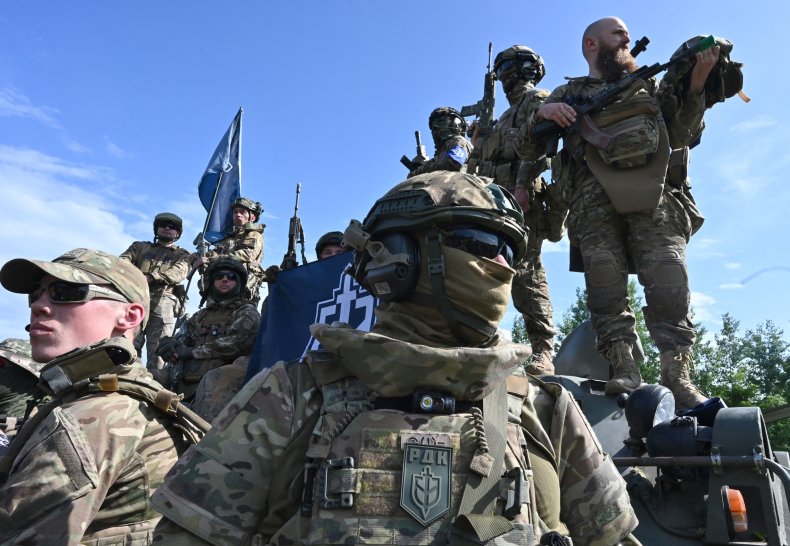Russia needs a citizen-led drone warning system, the head of a Russian research body said, as the country struggles with a slew of long-range unmanned aerial vehicle attacks Moscow blames on Ukraine.
Dmitry Kuzyakin, the director general of Russia’s Center of Complex Unmanned Solutions—which specializes in the production and development of drones and works with governmental defense and security agencies—told the state-run Tass news agency on Friday that “vigilant citizens” armed with smartphones can help the government detect the kind of strike drones that have been wreaking havoc on Russian infrastructure and residential areas.
The proposal echoes software developed in Ukraine to report the Russian missile and drone strikes that have accompanied Moscow’s full-scale invasion of the country, terrorizing citizens nationwide through 15 months of fighting.
“There should be a mobile application that vigilant citizens will install on their phones,” Kuzyakin told Tass. “It should be distributed through Russian marketplaces. The application is exactly one button with the message: ‘A drone flew over me.’ When you press the button, the application will transmit the coordinates of the place where the drone flies to the response center.”
NATALIA KOLESNIKOVA/AFP via Getty Images
“The western direction of our country is quite densely populated; it will be impossible to fly unnoticed so that no one hears. Based on the total number of alarms, you can determine the direction, speed and number of enemy drones that broke through the border,” Kuzyakin said.
Long-range drones—attributed to Ukraine by Russia but denied by officials in Kyiv—have been used to attack supply hubs, oil depots, and other strategic targets in western Russia in recent months, seemingly corresponding with so-called “shaping operations” for Kyiv’s long-awaited counteroffensive.
Drone attacks have even reached Moscow, with UAVs exploding above the Kremlin in early May, and this week damaging buildings in an upscale residential suburb of the capital.
Russian officials and media personalities have reacted with fury, though President Vladimir Putin has seemingly sought to downplay the significance of recent attacks. Still, he admitted after the recent Moscow attacks that “work” was needed to improve the capital’s air defense.
Along with repeated cross-border incursions by Kyiv-aligned anti-government Russian fighters, the recent wave of drone attacks raises questions about the military’s defensive capabilities. Newsweek has reached out to the Russian Defense Ministry by email for comment.
Mark Voyger—a former special adviser for Russian and Eurasian affairs to Lieutenant General Ben Hodges when he was commander of the U.S. Army Europe—told Newsweek the recent drone attacks and cross-border raids represent “a huge reputational blow” to Putin.
“It shows the world, but also his own regime and the Russian population, that Russia’s borders are no longer impermeable,” said Voyger, a non-resident senior fellow at Center for European Analysis and professor at American University of Kyiv. “Everyone assumed that Russia was so well protected. They’ve always taken seriously their abilities ability to seal off Russia physically and detach it from the rest of the world. And now Ukraine is proving this notion to be effectively an illusion, a lie.
“They’re getting a taste of what the Ukrainians have experienced and suffered for the last year and a half,” Voyger said of the Russian population. “But again, the big loser is Putin.”
With Ukraine’s long-awaited counteroffensive looming, the new security pressures will be an unwelcome complication for Moscow.
“I think that’s probably one of the primary goals, to distract the Kremlin in this period when the counteroffensive is about to begin,” Voyger said.

SERGEY BOBOK/AFP via Getty Images
Any added Russian discomfort will be welcome in Kyiv. Oleksandr Merezhko, a member of the Ukrainian parliament and chair of the body’s foreign affairs committee, told Newsweek that the recent attacks inside Russia speak to Putin’s strategic errors.
“Putin thought that he would conduct a blitzkrieg and miscalculated,” Merezhko said. “Then he thought that all hostilities would be only in the territory of Ukraine, and again had miscalculated. As the war drags on, there will be more and more hostilities taking place in the territory of Russia itself.
“The victim of the aggression under international law has the right to wage defensive war in the territory of the aggressor. Besides, there can be some armed militia groups in the territory of Russia resisting Putin’s regime. The fact is that the Russians will have to learn to live under conditions of war, and war is coming to their homes, which is inevitable.
“It will continue while Putin stays in power, and the safety situation for the Russian population will only deteriorate. The whole blame for this is only on the aggressor and its supporters, including tacit supporters.”
The worsening domestic security and economic situations, Merezhko suggested, might even undermine Putin’s hold on power.
“Putin might be removed from power by the Russian elite before presidential election in March 2024, because he became too toxic for Russian business elites,” he said.
“The population in Russia, despite massive propaganda and brainwashing, might also get tired of Putin, who has brought war and a ruined economy.”


